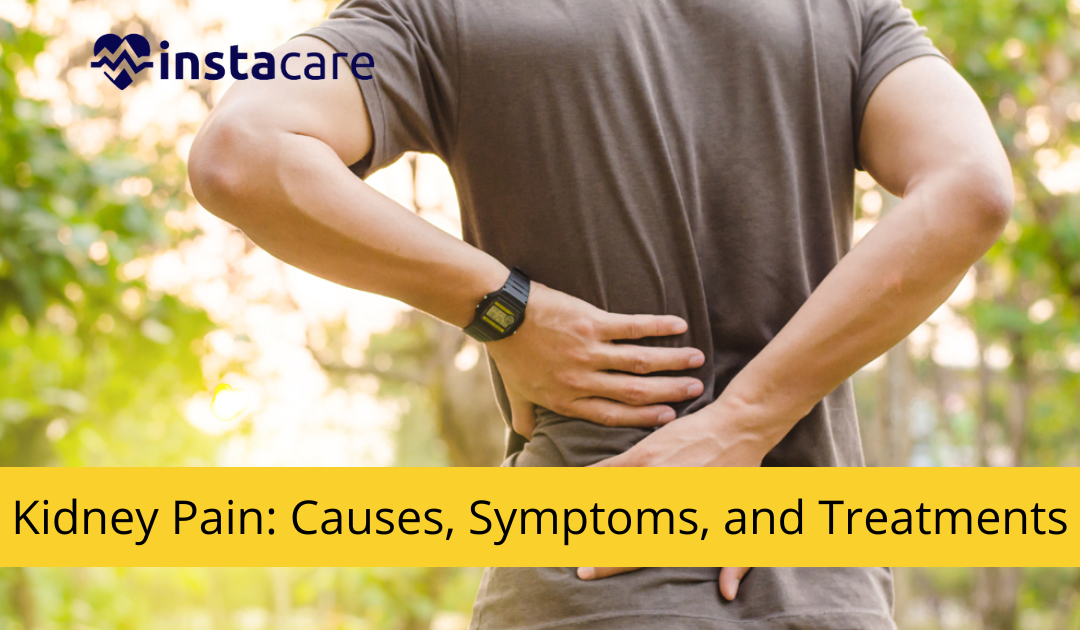One of our body's essential organs is the kidney. Its job is to flush hazardous waste from your body, remove debris from your blood, and produce urine to do the same for extra fluid. The kidney is shaped like a bean and is the size of your fist. The area behind your midsection, known as your side, is where they are located.
Pain in your kidney means some malfunction. It is essential to note the cause of pain that the pain is originating from your kidney or from elsewhere. It can be challenging to determine whether your kidney is the source of your discomfort or if anything beyond that is. Your kidney may cause pain, which can be determined by the information about the nature of your illness and any further concerns.
Signs Of Kidney Pain
Kidney pain is the pain around your kidneys, also known as renal pain. The pain occurs at the side of your spine. Although kidney pain typically indicates an issue with your urinary tracts. The characteristic sensation of kidney discomfort is a persistent dull aching down on the right or left side, or both sides, which frequently grows worse when the affected area is lightly touched. You usually only experience discomfort on one-half of your back since most illnesses damage one kidney. The pain will be felt on both flanks when both kidneys are compromised.
The main conditions may accompany kidney pain:
- Pee with blood
- Shivers and a temperature
- Excessive urine
- Nauseous and dizzy
- Groin discomfort is also present
- Discomfort or burning sensation when urinating
- Recent inflammation in the urinary tract (UTI)
Causes Of Kidney Pain
Mainly the ureters and bladder are connected to our kidneys. Issues can cause soreness in either of these regions. Among the potential reasons for renal pain are:
View More: Kidney Stones Causes Symptoms And Treatment
Renal Stones
Mineral or chemical accumulation within your system might result in kidney stones. Stones can range in size from dust motes to a gem. Small stones could naturally exit your system. More giant stones, however, could become lodged in your urinary system and obstruct urine flow. In both scenarios, severe renal pain may start to appear.
Bladder Retention
You seem unable to clear your bladder when you have this illness. This may take place instantly or slowly over time.
Cyst
A fluid-filled cyst may develop in one or both kidneys. Kidney cysts typically do not cause diseases, but occasionally they can get larger and push upon your internal organs, causing pain in your abdomen. If the cyst bursts, you can have excruciating side agony.
Polycystic Kidney Disease (PKD)
Both kidneys develop many cysts that might harm them in this genetic disorder. You could occasionally experience excruciating side or back pain as PKD develops and the cysts enlarge. Blood in your urine, hypertension and renal failure are further potential problems.
Renal Atheroembolic Illness
Tiny capillaries leading to either kidney may get blocked if plaque detaches from a giant artery. Among other signs like diarrhea and vomiting, you could also have stomach cramps.
Kidney Pain Location
Back pain typically occurs in the lower abdomen, above the column. Back discomfort may occasionally travel down to your knees due to spinal problems. In contrast, renal discomfort is typically felt stronger and is usually positioned upper on your back. Most of the time, indications of kidney discomfort are handled beneath your ribcage, either to the right or left of your spine. In addition to your kidneys, your stomach or groin may also be affected by kidney pain. Hip pain is somewhat mistaken for kidney pain. However, hip discomfort is located lower in the back than kidney pain.
Treatment Of Kidney Pain
The root cause will determine the course of therapy for kidney pain. Your doctor can use the following instruments to determine what is causing your signs:
Imagining Exams
Urological stone identification and blood supply evaluation are both possible using ultrasound.
Urinalysis
The examination finds any blood, an abundance of white blood cells (which could signify an infection), enzymes, and specific compounds that could indicate kidney problems.
Conclusion
You may have renal failure, in which your kidneys stop functioning if the ailment that was the source of your kidney pain is not quickly and accurately addressed. You should urgently see a doctor when you feel back discomfort, chronic pain around the kidneys, discoloured urine, and severe discomfort while urinating.
Please book an appointment with the Best Nephrologist in Lahore, Karachi, Islamabad, and all major cities of Pakistan through InstaCare, or call our helpline at 03100002273 to find the verified doctor for your disease.

